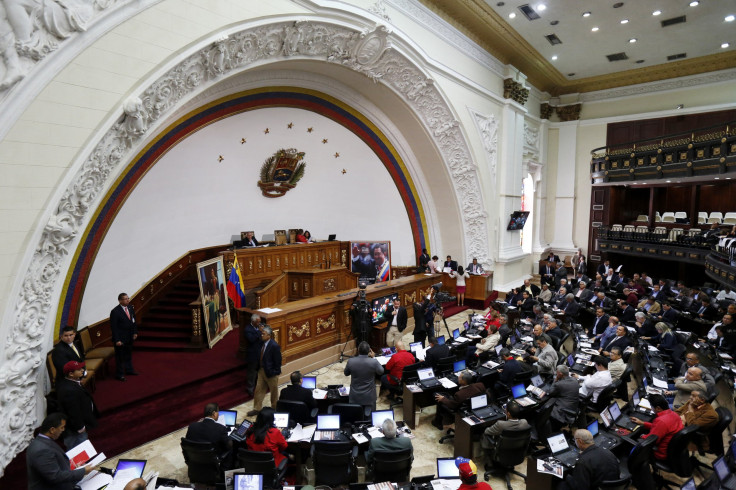Venezuela Lawmakers Begin Battle Over High-Stakes Legislative Elections

Venezuela’s opposition is hoping to win big in legislative elections later this year, as the struggling economy has turned popular opinion away from President Nicolas Maduro’s government. They’ve pledged to vote the president out of office if they win a large enough majority. But a small bureaucratic change approved by the legislature could alter the makeup of those elections, prompting an outcry from opposition members over what they say is a deliberate effort to solidify chavistas’ hold on power.
The National Assembly, which is dominated by members of Maduro’s United Socialist Party of Venezuela (PSUV), approved a population estimate from the national electoral commission this week that determines how many electoral seats are available for each state. But opposition members pointed out shifts in population figures for some districts that would grant additional electoral seats to chavista strongholds while diminishing the number of seats in areas with strong support for the opposition.
Nongovernmental organization Súmate issued a review of the report earlier this week, saying that modifications in 19 out of Venezuela’s 24 states ended up favoring the PSUV. The population figures approved this week would mean that even if the opposition secures 52 percent of the national vote, it would get only 67 of the available 165 legislative seats, while the rest would go to PSUV supporters, Spain’s El País reported.
During the legislative debate this week, lawmaker Pedro Carreño said that the population shifts were the result of migration following the construction of government housing projects in recent years, according to Venezuela’s El Universal newspaper. He also criticized the opposition’s claims of manipulation: “We have not even presented a time frame, but we are in a debate about the electoral projection and already talking about fraud,” he said. The opposition was trying to “demonize the institutions,” he added.
Opposition members voted against the report and submitted a letter to the electoral commission requesting an audit of the projections. Members of the Democratic Unity Roundtable, the political opposition coalition, also requested representatives from regional organizations Unasur and the Organization of American States, as well as the United Nations and European Union, to contribute to electoral observation missions this year to prevent fraud. “The evolution of these events may provoke protests and conduct violent situations that nobody wants,” coalition representative Vicente Bello wrote in the requests, according to news website Runrunes.
The legislative elections are scheduled to take place in late 2015, although the government still has yet to announce a date. The opposition has pledged to introduce a recall referendum to remove Maduro from power in 2016, but they need to secure a two-thirds majority in the legislature to ensure that the move would pass, which analysts say they are unlikely to get. But if they win a simple majority, they will still get control of the National Assembly in a significant challenge to Maduro’s power. The president’s approval rating has sunk dramatically over the past year and currently stands around 28 percent, according to polling firm Datanálisis.
© Copyright IBTimes 2024. All rights reserved.











